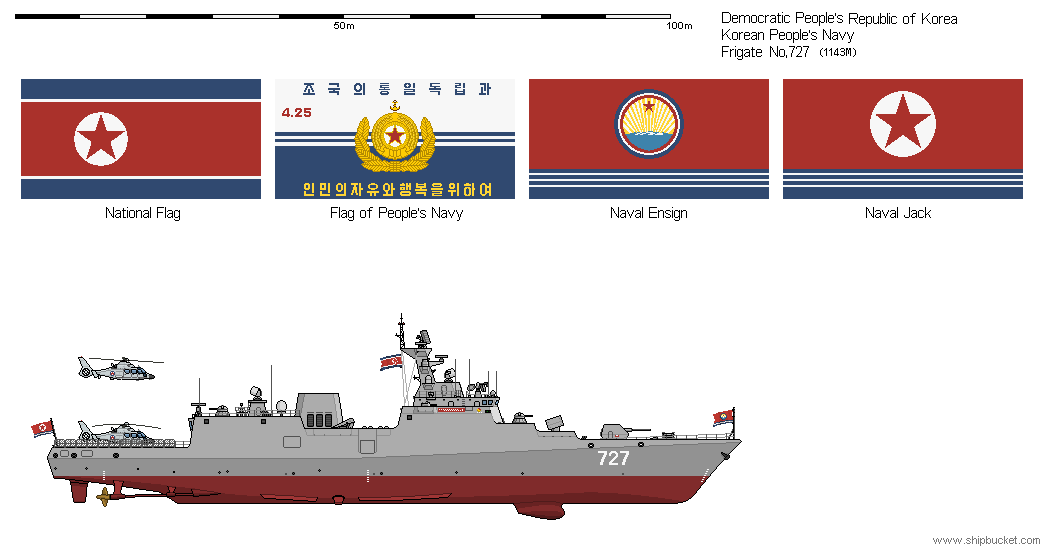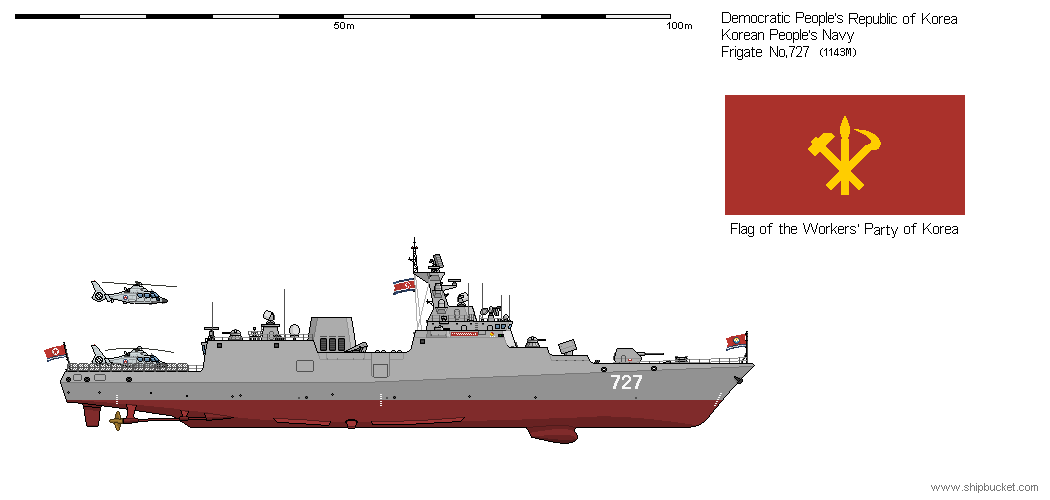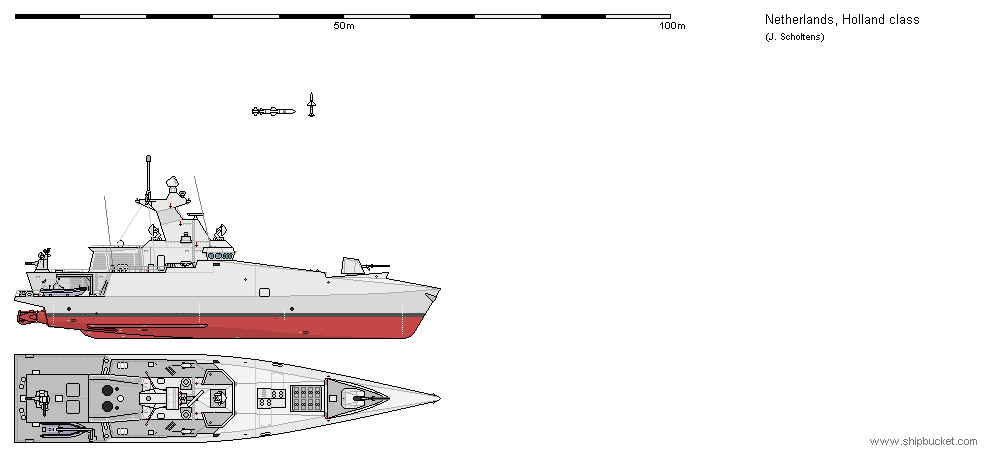The Shinsato Ken'Ichi class guided missile corvettes were named after Lt. Commander Shinsato Ken'Ichi, a sailor during the Saxalo-Akitsukuni War who went down with his ship while commanding a small flotilla of corvettes in battle against two Saxalonian heavy cruisers. The lead ship, USS
Shinsato Ken'Ichi, was launched in late 2021 and commissioned almost two years later in mid 2023. Her class was in many ways an experiment, and were the first ships in the USN to possess a number of later common features.
Most notably among these was her trimaran hullform, which was selected to improve stability and maximize deck and superstructure space. She also was the first large ship to have an outer hull made entirely from Carbon-Kevlar composite, albeit reinforced with steel structural members, which helped keep weight down and also ever so slightly reduced her radar signature, at the cost of making her around 10% more expensive than she otherwise would have been. She was also highly automated, to the point that she could operate in emergencies with less than a dozen crewmembers aboard for an extended period.
Her design was rather large for a corvette, but her classification as one was somewhat justified by her role and parent country. Akitsukuni, being a large collection of islands, naturally has a whole lot of coastline and an enormous amount of littoral regions, and small, fast ships optimized to fight in them have always been sorely needed by the nation throughout her history. These ships have traditionally been given the title of corvettes, and though other nations usually use different definitions, this is the one used by the USN.
The primary mission her class was designed to fulfill was one that would have been familiar to the torpedo-boat destroyers of the late 19th century that her larger sisters descended from; to patrol the Akitsukunian coastline, being ready to group into wolfpacks and help intercept any threats that managed to get close to the shore. Unlike her predecessors however, while she was extremely fast and relatively small, her main method of doing so was her low radar signature and suite of extremely advanced passive sensors, that would allow her to ambush and hopefully mission-kill larger warships from close range.
Her secondary mission - though it should be noted she was just as capable in it as her primary one - was to serve as a multipurpose patrol vessel, keeping watch over the Akitsukuian coastline for enemy submarines, and even engaging other ships in or below her weight class one-on-one. For this purpose she was fitted with one of the largest hangars and flight decks mounted on a USN warship, which was rated for simultaneous flight operations of 2 medium-weight helicopters (albeit only in light weather, as only one of the pads had a beartrap system).
Finally her tertiary mission, which she again was also extremely adept at, was to escort amphibious groups and provide fire support during landing operations, and to screen landing forces from enemy light naval attacks in the littorals. To help accomplish this, in addition to all of her other systems, she was fitted with a 55mm main gun capable of firing at 250 rounds per minute that could be loaded with a selection of chaff rounds, conventional rounds, extended range rounds, and the new Type 200A1 experimental 5.5x44cm special weapons, which had a dialable yield between 0.05 and 0.2 kilotons. This allowed her to destroy small and fast enemy combatants at close range, and to provide effective fire support as well.


I'm pretty sure B-sides aren't allowed under the current challenge rules, but I made one prior to being informed of that, so I may as well include it anyway, and if necessary the mods can remove it from my entry on the voting form. In the (rather likely) event that happens, here's also a textual copy of her specifications:
Ships in Class
USS
Shinsato Ken’Ichi (CK-1211) - 2021 - 2097
USS
Philippa Schneider (CK-1212) - 2021 - 2095
USS
Ishihara Isamu (CK-1213) - 2022 - 2100
USS
Miyasaki Tomio (CK-1214) - 2022 - 2093
USS
Henrietta Armstrong (CK-1215) - 2023 - 2098
USS
Goto Kenji (CK-1216) - 2023 - 2099
USS
Sawaya Minako (CK-1217) - 2023 - 2105
USS
June Simonds (CK-1218) - 2024 - 2108
USS
Tobe Yuichi (CK-1219) - 2024 - 2096
USS
Alina Salazar (CK-1220) - 2025 - 2115
USS
Shirai Ichirou (CK-1221) - 2025 - 2102
USS
Furukawa Akiko (CK-1222) - 2025 - 2113
USS
Brooke Tucker (CK-1223) - 2026 - 2120
USS
Murai Chiyoko (CK-1224) - 2026 - 2118
USS
Toma Nori (CK-1225) - 2027 - 2124
USS
Arima Tamotsu (CK-1226) - 2027 - 2121
USS
Percival Foster (CK-1227) - 2028 - 2130
USS
Suda Etsuko (CK-1228) - 2028 - 2126
General Specifications
Length: 395.5 ft overall, 365 ft waterline
Beam: 97.5 ft overall, 93.5 ft waterline
Drought: 13.5 ft light, 16.5 ft maximum
Displacement: 2,500 tonnes light, 3,500 tonnes maximum
Propulsion
2x Kobayashi Drive Yards IH-515 gas turbines (27,000 shp ea.)
2x Kobayashi Drive Yards IM-931 auxiliary gas turbines (5,500 shp ea.)
4x Ingram Heavy Industries YMF-5 emergency generators (375 shp ea.)
4x Kobayashi Drive Yards Type 27A2 pumpjets
1x Kobayashi Drive Yards Type 44A5 retractable bearing thruster
Speed: 18 kts using IM-931s, 46 kts using all turbines
Range: 4,100 nmi at 18 kts
Accommodation and Endurance
Crew complement: 35 main crewmembers + 30 mission crewmembers
Supplies: 24 days for 65 crewmembers
Underway replenishment: performed via helicopter using aft flight deck
Sensors
1x Lancelot-Baker Type 110A3 fixed-face electronically-scanned phased-array multi-function C-band RDF
1x Falcon Systems Type 89A7 rotating two-dimensional solid-state surface-search C-band RDF
1x Lancelot-Baker Type 94A3 fixed-face electronically-scanned phased-array multi-function C-band RDF (on Type 16A3 CIWS turret)
1x Lancelot-Baker Type 80A5 extendable mast-mounted electro-optical sensor suite
4x Falcon Systems Type 69A2 laser warning systems
1x Lancelot-Baker Type 45A4 hull-mounted duel-mode omni-directional high-bandwidth asdic system
Electronic Warfare and Decoys
1x Lancelot-Baker Type 57A2 extendable mast-mounted electronic warfare suite
2x Lancelot-Baker Type 49A4 directional infrared countermeasure systems
2x Alliance Technical Type 30A5 4-tube multipurpose autoloading decoy launchers (32 rounds ea.)
2x Lancelot-Baker Type 25A9 stern-mounted autoloading acoustic decoy launchers (18 rounds ea.)
Armament
4x Lancelot-Baker 8-cell Type 42A2 20 in VGMLS modules (32 cells tot. duelpack and quadpack compatible)
4x Alliance Technical 415 mm stern-mounted fixed-facing torpedo tubes (8 rounds rdy. 16 rounds in mag.)
1x United Defense 55 mm / 70 caliber Type 200A1 gun turret (120 rounds rdy. 880 rounds in mag.)
1x United Defense 30 mm / 75 caliber Type 16A3 close-in-weapon-system gun turret (1,200 rounds tot.)
2x Metal Storm Industries 35 mm / 17 caliber Type 18A5 close-in-weapon-system gun turrets (288 rounds ea.)
Small Craft Facilities
1x 10,200 sq ft flight deck aft
1x Internal hangar amidships (2 mediumweight helicopters, 2 lightweight helicopters, and 3 drones tot.)
2x Internal bays and davits on outer hulls aft (single 20 ft RHIB or equivalent ea.)
1x Internal bay and davits centerline aft (single 20 ft RHIB or equivalent and single UUV tot.)
This is probably the most detailed SB-scale drawing I’ve made yet, and I’m really proud of how she turned out. I’ve started experimenting with drawing panel lines using colors in-between the other shades, and adding a lot of really small details to both the top and side views, like various ports, lines, and pieces of equipment. The fact that she isn’t too different from a real LCS helped a ton, because it meant I had lots of very high-res visual reference material to work from.
I’ve also changed up the Akitsukunian national flag, because I thought the old one was fairly bad, and switched to using a slightly darker color scheme for the ship herself (though her helios use various different schemes, including an example of the old brighter color pallet).
Anyways, I also want to say thanks to all of the people over on the Discord who gave me massive amounts of advice on how to design and draw her! And I'd be interested in hearing any of your thoughts on how she turned out.














